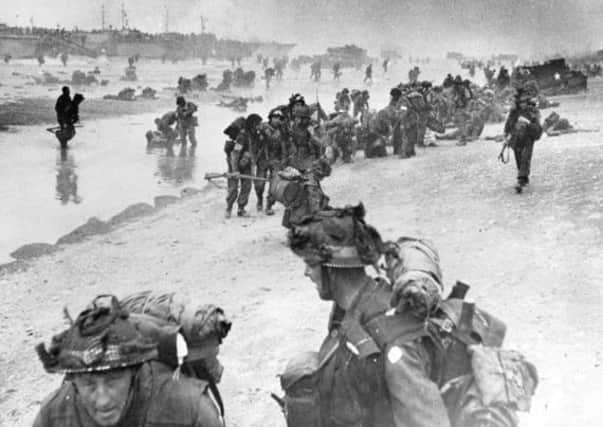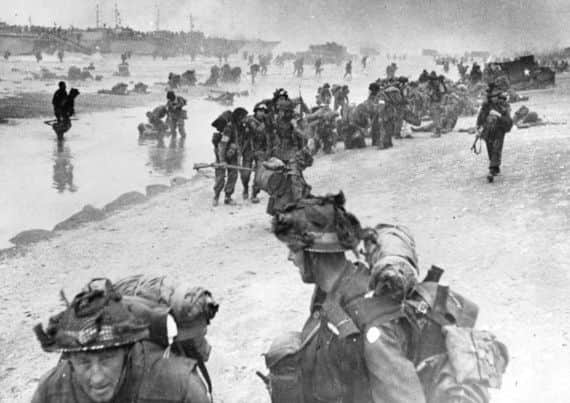Bloodshed on beaches paid the price for D-Day landing success


As dawn broke over the beaches of Normandy on June 6, 1944, the sight of ships packed with thousands of men heaved over the horizon - signalling the start of what is considered the greatest military invasion of all time.
For the thousands of men who crossed had crossed the English Channel in Operation Neptune, their mission was, put simply, to ‘destroy the German war machine’.
Advertisement
Hide AdAdvertisement
Hide AdMeticulous planning had gone in to the offensive against the Nazis. The forces involved in D-Day had been preparing for months, even years.


In the weeks before the landings, final training exercises were completed and the troops were moved to camps near the southern coast of England.
Timing was everything. The invasion had originally been scheduled to take place on May 1 that year, but was delayed to allow for the right conditions.
Every man knew of the risks involved as they embarked on the treacherous journey, making their bravery all the more admirable. Some landed in the moonlit early hours by gilder and parachute. Fighting, sometimes hand-to-hand to neutralise the German flanks, the others passing through the choppy waters.
Advertisement
Hide AdAdvertisement
Hide AdThe assault began just after midnight, when German coastal batteries between Le Havre and Cherbourg were bombed by the Allies, followed by British airborne troops beginning their attack on Pegasus Bridge and others along the River Orne.
Over the next five hours the combined bombardment and assault fleets anchored, while allied warships began bombarding the Normandy coastline. By the early hours of the morning, more than 5,300 tonnes of bombs had been dropped on the German shore defences.
Spread across a 50-mile stretch of shore, the five beaches were known by special codenames.
The Americans began landing on Utah beach, while the British swarmed Gold and Sword beaches, Canadian troops descended on Juno beach soon after.
Advertisement
Hide AdAdvertisement
Hide AdBack on home soil, the Yorkshire Evening Post hit the stands with a reassuring message to its readers from Prime Minister Winston Churchill, ‘Invasion of Northern France goes according to plan,’ declared the day’s headline.
“Heartening news that the Allied invasion of Northern France, which began this morning, is going to plan, was given by Mr Churchill,” the report began.
When troops first began to land overseas, only 14 of the 58 German divisions in France were there to face them. Everything appeared to be going according to plan.
A correspondent for the Combined British Press reported a ‘lack of appearance in strength’ of the Luftwaffe and ‘few losses’.
Advertisement
Hide AdAdvertisement
Hide AdAnd naval commander Admiral Sir Bertram Ramsay, said the landings had taken the Germans completely by surprise.
He added: “There was a slight loss in ships but so slight that it did not affect putting armies ashore.
“We have got all the first wave of men through the defended beach zone and set for the land battle.”
But the enemy proved resistant. As the first infantrymen set foot on the beaches, large-scale bloodshed began.
Advertisement
Hide AdAdvertisement
Hide AdOne Yorkshire veteran, Jack Quinn, aged 89, of Sheffield has recalled his comrades ‘dropping like flies’ as they ran across the sands attempting to dodge bullets and treading on mines.
Over the Channel the PM addressed the House of Commons on the operation.
The landing of airborne troops was ‘on a scale far larger than anything there has been so far in the world’, he told MPs.
By the afternoon, however, counter attacks led to more casualties. What are now revered as glorious acts of heroism came at a grave cost.
And there were struggles.
Advertisement
Hide AdAdvertisement
Hide AdDuring the landing at Omaha, difficulties in navigation caused the majority of landing craft to miss their targets throughout the day.
Defences were unexpectedly strong, and inflicted heavy casualties on landing US troops.
On the whole, however, the vast majority of objectives had been achieved by sunset.
In the 24-hour period which became known as D-Day, a total of 75,215 British and Canadian troops and 57,500 US troops had landed by sea, with a further 23,400 arriving by air.
Advertisement
Hide AdAdvertisement
Hide AdWithin the next 10 days, half a million men had landed in Normandy. The German 7th and 15th Army were being pushed back.
France was being liberated from occupation at long last.
After D-Day, the days of the German resistance were numbered.
The events which unfolded on the 1738th day of the Second World War are credited with being the catalyst for German surrender which brought the conflict to an end in 1945.
The significance of the military’s success is one which is forever etched in the history books, but it is the sacrifice made by the 10,000 men who were killed, horribly injured or went missing that day which will be at the forefront of commemorative events today.
Advertisement
Hide AdAdvertisement
Hide AdThroughout the decades which followed the D-Day landings The Yorkshire Post has paid tribute to those who lost their lives, and the brave men lucky enough to have survived.
The ‘immeasurable’ debt of honour owed to both the men and women involved in the long battle is one which readers have frequently been reminded of on the pages of this newspaper.
Today’s landmark anniversary is made all the more poignant by the fact that for many veterans the emotional pilgrimage could be their last.
Regional branches of the Normandy Veterans Association, including Sheffield, are expected to disband within the year.
Advertisement
Hide AdAdvertisement
Hide AdCalling upon the nation to remember those lost their lives in the landings, Prime Minister David Cameron today said it ‘there has never been a more important time’ to reflect on their sacrifice.
He said: “Just as British and French soldiers fought for victory against a common enemy on the beaches of Normandy, today France and the UK stand shoulder to shoulder against the threats of the modern world.
“We remain united against international terrorism and extremism – and in recent times our armed forces have served together in Afghanistan, Libya, Mali and elsewhere around the world.
“As we look forward to the future I believe we should take strength from the shared hardship of our experience during World War Two. It has forged our unique relationship and created a shared determination to work together.”